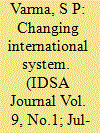| Srl | Item |
| 1 |
ID:
184673


|
|
|
| 2 |
ID:
178166


|
|
|
|
|
| Summary/Abstract |
The heavy-metal pollution of the consumer-electronics industry has been a serious environmental problem in China. Since 2010, Chinese ENGOs have taken a few measures to address this challenge. Under the influence of other stakeholders, Chinese ENGOs have only played a limited role. To further explore the potential of domestic ENGOs, it would be necessary to understand how they have approached the heavy-metal challenge and why their contribution has been moderate. By using the method of “process tracing,” this paper presents a preliminary attempt to trace and generate localized knowledge of Chinese ENGOs’ approach and the influence of other stakeholders. Specifically, this paper divides the actions of Chinese ENGOs into the following three phases: initial participation, progressive involvement of MNCs, and collaborative tracking and online disclosure. Then, it traces the participation of Chinese mass media, domestic suppliers, local governments, and communities. It argues that the following six constraining factors have contributed to shaping the limited role of those Chinese ENGOs: (1) the complexity of the consumer-electronics supplier network; (2) Chinese ENGOs’ lack of leverage on MNCs; (3) Chinese ENGOs’ shortage of financial and human resources under a broad agenda; (4) domestic mass media’s lack of long-term interest; (5) reluctant participation of Chinese suppliers and local governments; and (6) conflicting interests within local communities. Three policy options for further exploring the potential of Chinese ENGOs are discussed, including financial and technical support, further engagement of international ENGOs, and supportive policy-making and interregional coordination by local governments.
|
|
|
|
|
|
|
|
|
|
|
|
|
|
|
|
| 3 |
ID:
119915


|
|
|
|
|
| Publication |
2013.
|
| Summary/Abstract |
This paper contributes to the theory of subsidiary evolution in multinational corporations through utilising a value chain approach. It assesses the changing activities of the branches of Japanese electronics firms located in Southeast Asia (the ASEAN region) since the 1997-1998 financial crisis. In the paper, we argue that a modest development of Japanese subsidiaries has occurred in this region during the past 10 years or so. We connect models of subsidiary development to Michael Porter's value chain in the results of a set of interviews with 37 managers in the factories, sales offices and regional headquarters of Japanese subsidiary companies located in Singapore, Malaysia and Thailand. We show that decentralisation of management functions from Japan occurred in both primary and support activities of the value chain. However, corporate long-term research and development did not disperse to Southeast Asia and is unlikely to in the near future. The article interprets these results and highlights the need for further research relating to the evolving geography of Japanese electronics multinational corporations and their subsidiaries in Southeast Asia.
|
|
|
|
|
|
|
|
|
|
|
|
|
|
|
|